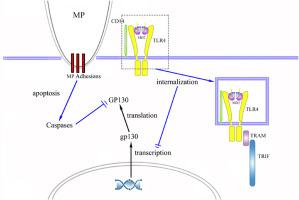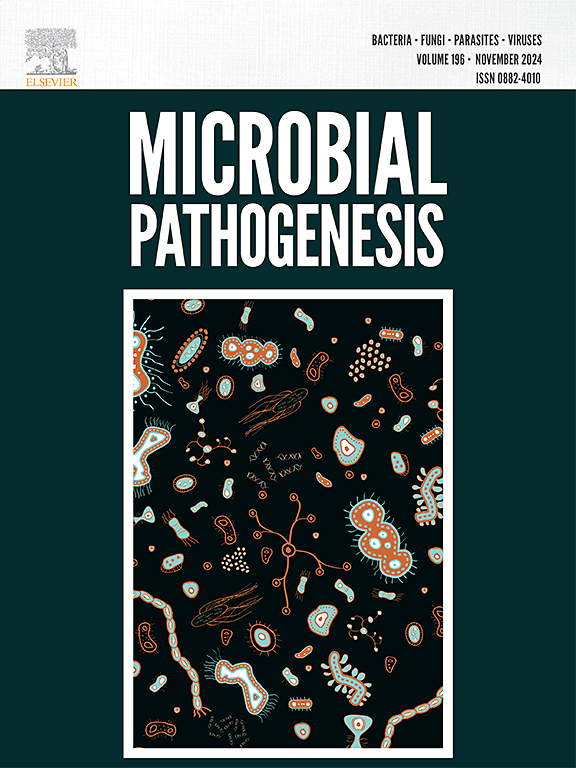肺炎支原体在感染过程中通过细胞凋亡和 TLR4/ NF-κB 通路调节肺上皮细胞中 GP130 的表达。
IF 3.3
3区 医学
Q3 IMMUNOLOGY
引用次数: 0
摘要
先前的研究显示,患有 MPP 的儿童血清中 GP130 的水平较低。GP130是一个重要的信号转导子,它的下调可能会影响宿主的免疫反应。本研究旨在分析 GP130 在 MP 感染过程中的调控机制。首先,GP130 的 mRNA 和蛋白水平均随着 MP 感染倍率(MOI:1-40)的增加而先降后升。MOI为5时检测到的GP130水平最低。然后,热处理的 MP 而非胰蛋白酶处理的 MP 或 MP 提取蛋白对 GP130 的表达有调节作用。这表明 GP130 的下调与蛋白介导的 MP 粘附过程有关。基因表达分析表明,MP 会影响感染细胞的凋亡和 TLR4 通路,IL-6 的 mRNA 水平与 GP130 的 mRNA 水平相关。此外,Z-VAD-FMK(泛天冬酶抑制剂)能抑制 MP 感染诱导的细胞凋亡,并在蛋白水平上恢复 GP130。进一步的研究发现,MP 感染会促进 TLR4 内化,但不会激活 NF-κB 通路。表面 TLR4 的水平与 IL-6 和 GP130 的转录相关。TAK242(TLR4抑制剂)和PS341(蛋白酶体抑制剂)能恢复GP130的转录,两者都能促进MP感染细胞中NF-κB通路的激活。这表明,TLR4/NF-κB通路的调控和MP感染后诱导的细胞凋亡分别在转录和蛋白水平上参与了GP130的下调。本文章由计算机程序翻译,如有差异,请以英文原文为准。

Mycoplasma pneumoniae regulates the expression of GP130 in lung epithelial cells through apoptosis and TLR4/ NF-κB pathway during infection
In previous study, lower levels of serum GP130 were reported in children with MPP. GP130 is an important signal transducer, the down regulation of which may influence host immune responses. In this study, we aimed to analyze the regulatory mechanism of GP130 during MP infection. Firstly, the mRNA and protein levels of GP130 both decrease and then increase with increasing multiplicity of infection (MOI: 1 to 40) of MP. The lowest levels of GP130 were detected at MOI of 5. Then, heat treated MP but not trypsin treated MP or MP extracted proteins show regulatory effect to the expression of GP130. These indicate that the down regulation of GP130 is related to protein mediate adhesion process of MP. Gene expression analysis revealed that MP affected apoptosis and the TLR4 pathway in infected cells, and the mRNA level of IL-6 was correlated with that of GP130. Further, Z-VAD-FMK (pan-caspase inhibitor) can suppress the apoptosis induced by MP infection and restore GP130 at protein level. Further studies revealed that MP infection promoted TLR4 internalization but did not activate the NF-κB pathway. The levels of surface TLR4 showed correlation with the transcription of IL-6 and GP130. TAK242 (TLR4 inhibitor) and PS341 (proteasome inhibitor) can restore the decreased transcription of GP130, both of which were able to promote NF-κB pathway activation in MP-infected cells. These suggested that the regulation of TLR4/NF-κB pathway and induced apoptosis post MP infection are involved in the down-regulation of GP130 at transcription and protein levels, respectively.
求助全文
通过发布文献求助,成功后即可免费获取论文全文。
去求助
来源期刊

Microbial pathogenesis
医学-免疫学
CiteScore
7.40
自引率
2.60%
发文量
472
审稿时长
56 days
期刊介绍:
Microbial Pathogenesis publishes original contributions and reviews about the molecular and cellular mechanisms of infectious diseases. It covers microbiology, host-pathogen interaction and immunology related to infectious agents, including bacteria, fungi, viruses and protozoa. It also accepts papers in the field of clinical microbiology, with the exception of case reports.
Research Areas Include:
-Pathogenesis
-Virulence factors
-Host susceptibility or resistance
-Immune mechanisms
-Identification, cloning and sequencing of relevant genes
-Genetic studies
-Viruses, prokaryotic organisms and protozoa
-Microbiota
-Systems biology related to infectious diseases
-Targets for vaccine design (pre-clinical studies)
 求助内容:
求助内容: 应助结果提醒方式:
应助结果提醒方式:


